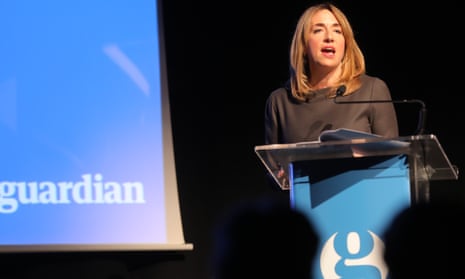Facebook has become the most powerful publisher in history by replacing editors with algorithms and has divided public debate in a way that challenges democracy, Katharine Viner, the editor-in-chief of the Guardian, has said.
In a wide-ranging speech that addressed the tumultuous challenges facing the Guardian and other media organisations, Viner also accused Donald Trump and other politicians of actively undermining journalism’s public interest role in a democracy and warned there was a “march against free speech” in countries such as Russia, Turkey, and Malta, where investigative journalist Daphne Caruana Galizia was murdered.
“Championing the public interest and the continued freedom of the press – which has always been at the heart of the Guardian’s mission – has become an urgent necessity,” she said.
While the Guardian editor argued that the emergence of the internet had allowed mass communication to be “open, creative, egalitarian” – helping to vastly improve journalism – there had also been unforeseen consequences.
“Our digital town squares are mobbed with bullies, misogynists and racists, who have brought a new kind of hysteria to public debate. Our movements and feelings are constantly monitored, because surveillance is the business model of the digital age,” Viner said in London on Thursday night.
“Facebook has become the richest and most powerful publisher in history by replacing editors with algorithms – shattering the public square into millions of personalised news feeds, shifting entire societies away from the open terrain of genuine debate and argument, while they make billions from our valued attention. This shift presents big challenges for liberal democracy. But it presents particular problems for journalism.”
Viner said the digital journalism produced by many news organisations had become “less and less meaningful” because the bulk of online advertising now went to Google and Facebook.
Publishers funded by algorithmic adverts – a form of targeted advertising that aims to reach audiences with certain characteristics rather than being specifically placed on a website – were “locked in a race to the bottom in pursuit of any audience they can find – desperately binge-publishing without checking facts, pushing out the most shrill and most extreme stories to boost clicks”, she added.
To be more meaningful and rebuild trust from historic lows, media organisations had to be more representative of societies they represented, and focus on facts, Viner said.
“Journalists must work to earn the trust of those they aim to serve. And we must make ourselves more representative of the societies we aim to represent. Members of the media are increasingly drawn from the same, privileged sector of society. This problem has actually worsened in recent decades,” she said.
“The Guardian is not at all exempt from these challenges, and our staff is not diverse enough. Because of our history, values and purpose, we are committed to addressing these issues – but there is still a long way to go.”
Viner said that the priority for the Guardian had developed from exploring the idea that “comment is free” to ensuring that “facts are sacred” amid the dramatic changes in the media and political landscape.
The Guardian is now funded by more than 800,000 supporters from more than 140 countries, and is read by more people than ever before. Viner said the organisation wanted to collaborate with its readers to develop new ideas rather than just criticising “the status quo”. This would involve embracing “as wide a range of progressive perspectives as possible” and supporting policies and ideas but not giving “uncritical backing to parties or individuals”.
“If people long to create a better world, then we must use our platform to nurture imagination – hopeful ideas, fresh alternatives, belief that the way things are isn’t the way things need to be. We cannot merely criticise the status quo; we must also explore the new ideas that might displace it. We must build hope,” she said.
